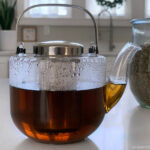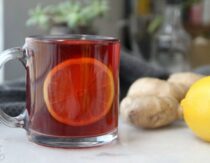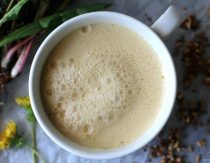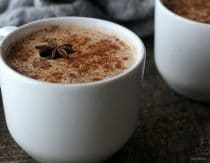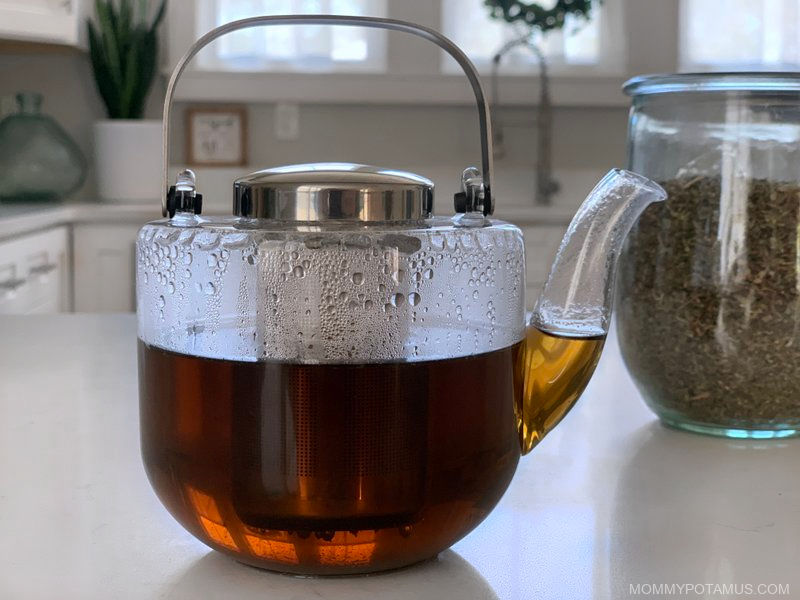
“When in doubt, use nettle.” << Spoken by renowned herbalist David Hoffman, this bit of wisdom has benefitted my family more times than I can count. (1) Often called Nature’s Multivitamin because it contains so many nourishing vitamins, minerals, and antioxidants, stinging nettle (Urtica dioica) supports a wide variety of essential functions in our bodies.
Now, if you’ve ever encountered it in the wild, you may not be sure you want nettle in your kitchen. As someone who regularly felt its sting growing up I get it, but in this article I’ll dive into why I now consider it an essential part of my First Aid + Natural Remedy Kit, and why you might want to also.
As always, I want to mention that none of these statements have been evaluated by the FDA, this article is not medical advice, and it is not meant to diagnose or treat any condition. Please talk with your healthcare provider about any herbs you are considering. Now that we’ve got that out of the way, let’s dive in.
- What is nettle?
- 10 Benefits of Nettle Leaf Tea
- 1. Mineral Rich Support for Healthy Hair, Bones & More
- 2. Antioxidants for Counteracting Oxidative Stress
- 3. Detox Support
- 3. Energy Support
- 4. Seasonal Allergy Support
- 5. Reproductive Health
- 6. Immune Support
- 7. Blood Sugar Metabolism
- 8. Cardiovascular Health
- 9. Skin Soothing
- 10. Hair Rinse
- Does Nettle Tea Have Any Side Effects?
- Nettle Leaf Tea Recipe (Nettle Infusion)
- More Therapeutic Herbal Tea Recipes
- Frequently Asked Questions
- Recommended Teapots
What is nettle? ^
Stinging nettle’s scientific name, Urtica dioica, comes from the Latin word uro, which means “to burn,” because it’s covered in tiny, stiff hairs that cause a temporary burning sensation upon contact.
Fortunately for us, cooking or drying out nettle deactivates the formic acid that causes the stinging sensation, leaving us with the other nutritive compounds to work with. That’s not to say that the formic acid isn’t considered therapeutic by some – it’s actually used been topically in studies to ease joint discomfort. (2)(3)
Originally native to Europe, Asia and North Africa, nettle is now found worldwide including New Zealand and North America. The leaves and roots have a long history of use as a traditional medicine, food, and raw material for making textiles.
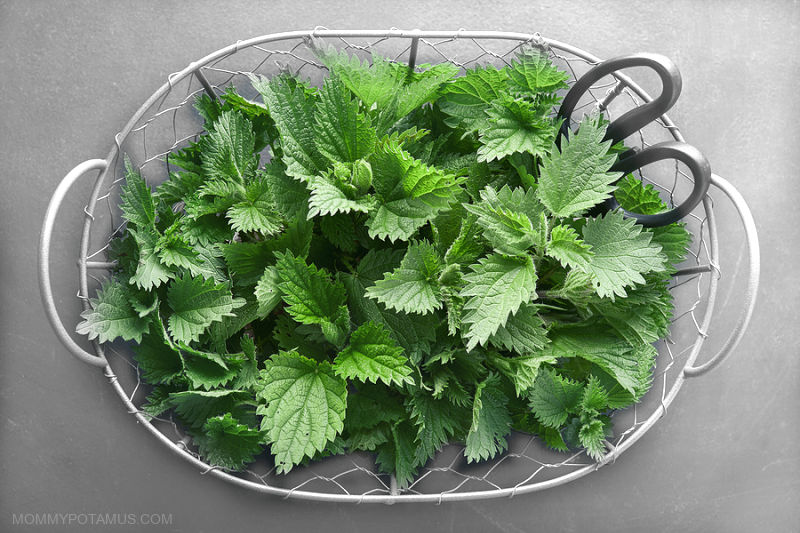
10 Benefits of Nettle Leaf Tea ^
Despite nettle’s sting, most herbalists will search high and low for a yearly supply of this valuable herbal tonic.” JJ Pursell, The Herbal Apothecary
Nettle contains so many beneficial compounds that it’s impossible to list them all here, but here are some of the most significant ones and how they benefit the body:
1. Mineral Rich Support for Healthy Hair, Bones & More ^
Minerals are the spark plugs of our bodies. They act as cofactors for enzyme reactions, contract and relax muscles, transfer nutrients into our cells and conduct messages from our nerves along with other jobs like forming the structure of our bones and regulating pH.
Nettles leaves contain a wide variety of minerals including calcium, magnesium, iron, zinc, potassium, chromium, manganese, copper, selenium and silica. (4)
Because it also contains vital cofactors for building bone – vitamins D and K, for example – it’s often recommended by herbalists to support strong, healthy bones.
“Nettle is full of nutrients that are important for healthy bones, teeth and hair,” writes Rosalee de la Foret, author of Alchemy of Herbs. She adds that it has “approximately 2,900 mg of calcium for each 100 grams of the dried leaf” that is “easily absorbed by our bodies (which is not the case when it comes to calcium supplements.)”
When my son broke his wrist, I made him a Bone Support Tea with nettle, another mineral-rich herb named oatstraw, and peppermint leaf (for flavoring) to support his recovery.
2. Antioxidants for Counteracting Oxidative Stress ^
We know that excessive amounts of free radicals – which our bodies produce as byproducts of metabolism – cause oxidative stress that can lead to accelerated aging and several disease processes. Fortunately, as this Live Science article puts it,
Antioxidants are able to give an electron to a free radical without becoming destabilized themselves, thus stopping the free radical chain reaction. ‘Antioxidants are natural substances whose job is to clean up free radicals. Just like fiber cleans up waste products in the intestines, antioxidants clean up the free radical waste in the cells,’ said Wright.”
Nettle is rich in a wide variety of constituents that act as antioxidants, including vitamin C, polyphenols (kaempferol, quercetin, caffeic acid, coumarins), and pigments (provitamin A beta-carotene, lutein, luteoxanthin and other carotenoids). (5)
Studies indicate that consumption can actually raise levels blood antioxidant levels. (6)(7)
3. Detox Support ^
Many people think of detoxing as something you do on rare occasions, perhaps with the aid of green smoothies and a restrictive diet. In truth, detoxing is a critical function that happens every moment of every day in the cells of your body. The best way to promote healthy detoxing is to give regular support to your major detox organs to do their job well.
Nettle supports many detox organ systems, including the liver, lungs, and urinary tract.” Rosalee de la Foret, Alchemy of Herbs (8)
Medical herbalist David Hoffman agrees, saying that “Throughout Europe, nettle is used as a spring tonic and general detoxifying remedy.” (9)
3. Energy Support ^
Herbalists often recommend taking nettle regularly to help increase energy levels. While nettle assuredly works in many ways, I surmise that its high nutrient level is what helps create more energy.” (8)
4. Seasonal Allergy Support ^
Nettle is rich in flavonoids like quercetin, which studies suggest may support the stabilization of mast cells (the immune cells that release histamine). (10)
You’ve probably heard of antihistamines before – the over-the-counter medications that are sold to relieve allergy symptoms (sometimes called hay fever or allergic rhinitis).
To understand how histamines work, think of your body as a bathtub, histamines as water and your ability to break them down as the drain.
When our bodies encounter pollen, grass, mold, cedar, ragweed, pet dander, dust mites and other airborne compounds, our immune system may see them as invaders or irritants that need to be dealt with. It then triggers the release of histamines which increases blood flow to the affected area, causing inflammation, symptoms like sneezing, and sometimes the production of mucus.
The sneezing/coughing/mucus helps clear the irritant away and histamines job is done, so your body breaks it down . . . . usually.
Sometimes, though, the body’s drain is clogged or the body over-produces histamine. By supporting the stabilization of mast cells (which produce histamine) and assisting with detoxification (more on that below), nettle is considered a go-to by many herbalists for easing seasonal discomfort.
In addition, it contains an alkaloid compound called synephrine that is used in traditional Chinese herbal medicine for seasonal issues. (11)
5. Reproductive Health ^
“Because of its nutritive properties and positive effects on the liver, nettle is also an excellent tonic for the reproductive system of both men and women.” (1)
Nettle has long been used to nourish the adrenal glands, which are often put to the test during the pregnancy and postpartum period.
It’s also thought to reduce the discomfort of labor and birth and nourish the kidneys, which are responsible for cleaning the extra blood required to sustain pregnancy. (12) You can find my pregnancy tea recipe that includes nettle here.
JJ Pursell, author of The Herbal Apothecary, also lists it as a galactagogue, or herb that increases breastmilk production.
Note: Some sources say that nettle should not be consumed by pregnant women because it can cause uterine contractions. However, The Botanical Safety Handbook – which is a trusted source for evidence-based herbal information – lists it as having “no identified concerns for use during pregnancy or lactation.”
Many midwives and herbalists actively encourage nettle leaf intake during pregnancy because they believe it nourishes and tones the uterus in preparation for birth. It’s included in many pregnancy teas sold by respected herbal companies.
6. Immune Support ^
Nettle supports the production of both red and white blood cells, which help keep the blood, body and immune system functioning well. (13)
It’s also rich in vitamin C, which according to this study supports “various cellular functions of both the innate and adaptive immune system.”
Our bodies don’t make vitamin C, so the only way to optimize levels is through dietary intake. Heat typically destroys it, but this study found that steeping stinging nettle leaves for 10 minutes in water at a temperature of 122–140°F (50–60°C) optimally extracted the vitamin C while keeping it intact.
7. Blood Sugar Metabolism ^
Nettle plants contain a compound called urticin that supports blood sugar metabolism. In animal studies, it’s been shown to optimize the ability to handle blood sugar spikes during a glucose challenge test, leading to more balanced blood sugar levels. (14)
Human studies have found similar effects. (15)(16)
8. Cardiovascular Health ^
Nettle is a rich source of potassium, which helps maintain healthy blood pressure by stimulating the release of sodium via urine and easing tension within the walls of blood vessels. (17)
In one study, consumption of nettle for eight weeks also had a positive impact on HDL cholesterol (the “good kind”l) and nitric oxide levels. (18)
Nitric oxide is a vasodilator, which means it relaxes the inner muscles of your blood vessels, causing them to widen. This vasorelaxation effect increases blood flow and lowers tension within blood vessel walls.
9. Skin Soothing ^
Nettle is used both internally (as a supplement or tea) and externally (as a topical skin infusion) to soothe skin irritations, especially in acne-prone or eczema prone skin.
The nettle tea recipe below can be dabbed on skin with a cotton ball in the same way that you would apply an astringent. However, as with all skincare products, it’s recommended that you apply it to a small area of skin to be sure you don’t have a skin sensitivity or allergic reaction to nettle before applying it to the desired area.
10. Hair Rinse ^
Because of its high mineral content (especially silica) and ability to encourage blood flow, nettle leaf tea is sometimes used as a hair rinse to encourage thickness and shine.
To use, brew the tea below and allow it to cool, then pour it over your hair after shampooing. Wrap your head in a towel and allow it to infuse for 15-20 minutes, then rinse and condition if desired.
Does Nettle Tea Have Any Side Effects? ^
Despite its ‘sting,’ which can most definitely leave large, sore welts, nettle is generally considered a wonderfully safe, edible medicinal plant.” – Rosemary Gladstar’s Medicinal Herbs
According to the Botanical Safety Handbook, 2nd edition, it’s a Safety Class 1A herb – the safest rating possible. It is described as:
- “Herbs that can be safely consumed when used appropriately.
- History of safe traditional use
- No case reports of significant adverse events with high probability of causality
- No significant adverse events in clinical trials
- No identified concerns for use during pregnancy or lactation
- No innately toxic constituents
- Toxicity associated with excessive use is not a basis for exclusion from this class
- Minor or self-limiting side effects are not bases for exclusion from this class”
The handbook notes that no drug or supplement interactions had been identified (at the time of publication) in clinical trials, case reports or animal trials. I’m not aware of any that have been identified after publication, either, but some herbalists think it might possibly interact with some medications.
For example, in Medical Herbalism David Hoffman writes that “Internal use may theoretically decrease the efficacy of anticoagulant drugs.” (8)
Also, it may increase the effect of some medications. Nettle is considered a mild diuretic, which means it helps the body get rid of excess fluid and salt (aka water retention). If you’re on a prescription diuretic, nettle may enhance its effects and potentially lead to dehydration.
Bottom line: If you’re on blood thinners, blood pressure medication, diuretics, diabetes medication, or Non-Steroidal Anti-Inflammatory Drugs (NSAIDs), speak with a doctor if you’re considering nettle. (19)
Also, if you’re using fresh nettle leaves, keep in mind that “It is not recommended that nettle leaves be eaten after the plant has gone to flower/seed.” (8)
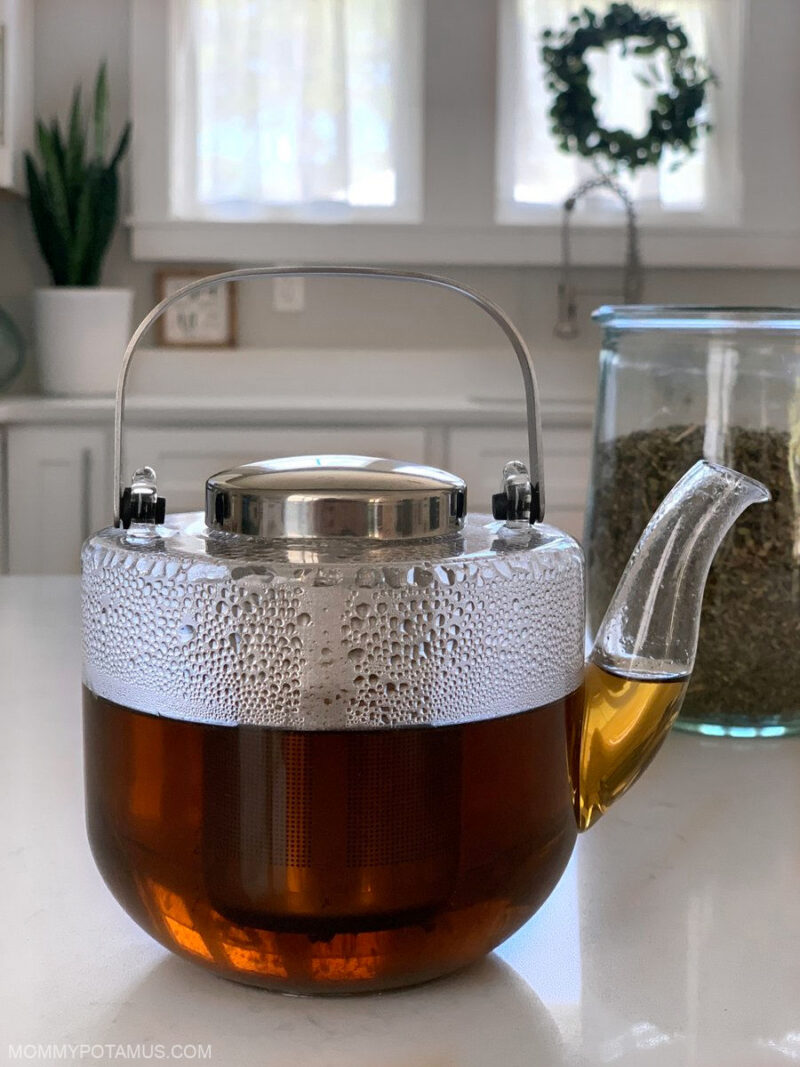
Nettle Leaf Tea Recipe (Nettle Infusion) ^
Ingredients
- 1 cup water
- 1-3 tsp dried nettle leaf (or 1-3 tablespoons fresh nettle leaf)
Instructions
- Place your tea in an infuser basket – I love this mug because it comes with an infuser basket and a lid. It holds 16 ounces, so if you happen to pick one up you'll want to double the recipe. If you don't have an infuser basket, you can make the infusion and then strain the liquid through a fine mesh strainer into your mug.
- Boil the water and pour it over the herbs. Cover with a small plate (or a tea cover if you have one) and allow the tea to infuse for 10-15 minutes.
- Remove the infuser basket and sweeten the tea with honey, maple syrup, etc. if desired.
Notes
Nutrition
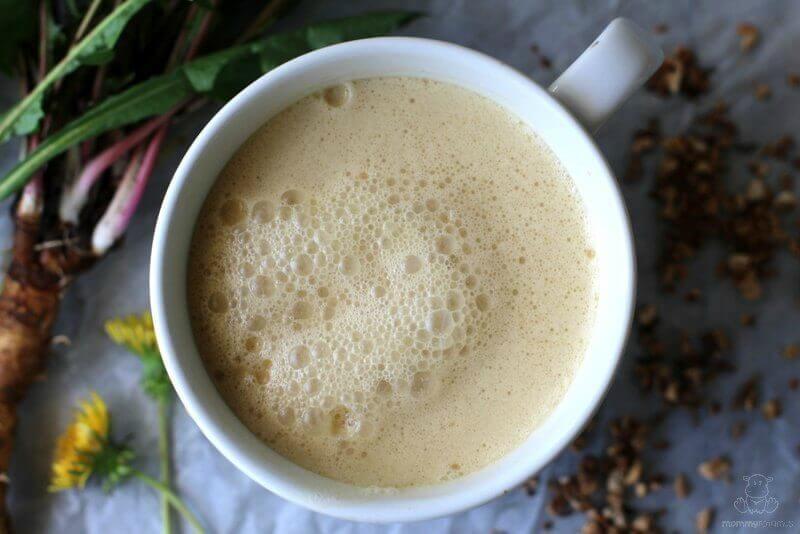
More Therapeutic Herbal Tea Recipes ^
Elderberry Tea – Renowned for their health benefits such as supporting immune and cardiovascular function, elderberries are delicious when brewed into an antioxidant-rich tea.
Roasted Dandelion Root Tea – This rich, creamy tea is so yummy that I always make a double batch – one cup for me, and one to replace that cup when my littles steal away its deliciousness. 🙂 It’s helpful for balancing hormones, detoxification, and digestion.
Lemon Balm Tea – Lemon balm is gentle yet potent, making it perfect for use with kids & adults for a mood lift, supporting relaxation and deep sleep, first aid, and more.
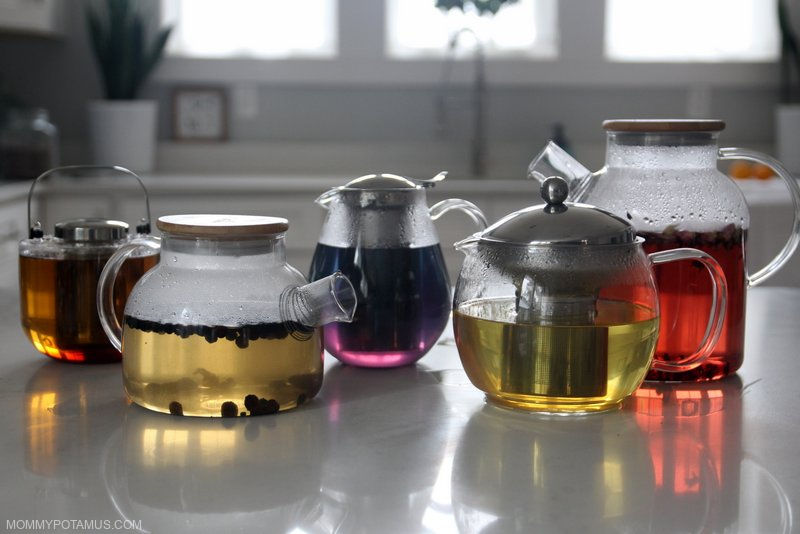
Frequently Asked Questions ^
Where can I find the teapot in the photo?
Recommended Teapots ^
Whenever I post about the benefits of a particular herbal tea I’m sipping on, I usually get a ton of comments like “Love that herb so much but seriously TELL ME ABOUT THAT TEAPOT.”
You’ll find it in this list of my top five favorite kettles, including a few that are stovetop safe.
What does nettle leaf tea taste like?
It has a mellow, hay-like flavor similar to green tea. It blends beautifully with a bit of honey and/or more flavorful herbs like peppermint.
What are some other ways I can use nettle leaf?
Add it to soups and stews to increase the nutritional content. I like to add 1-2 tablespoons to this Instant Pot Chicken Soup.
Want more research-backed natural remedies?
No problem, I’ve created a free ebook for you – Kitchen Apothecary: 25+ Natural Remedies Using Ingredients From Your Pantry – as a gift for signing up for my newsletter. You’ll also get updates when I post about safe essential oils for pregnant/breastfeeding mamas, exclusive gifts and coupons (I was able to give away a jar of free coconut oil to anyone who wanted it recently!), plus other goodies.
Sign up using the form below.
1. Gladstar, Rosemary (2012) Rosemary Gladstar’s Medicinal Herbs
2. Johnson, Tyler et. al. (2013) Lipophilic stinging nettle extracts possess potent anti-inflammatory activity, are not cytotoxic and may be superior to traditional tinctures for treating inflammatory disorders
3. Rayburn, Keith etl. al. (2009) Stinging nettle cream for osteoarthritis
4. Pedersen, M. (1987). Nutritional herbology: A reference guide to herbs.
5. Upton, Roy (2012) Stinging nettles leaf (Urtica dioica L.): Extraordinary vegetable medicine
6. Behzadi, Alidad Amiri et. al. (2016) Effects of Urtica dioica supplementation on blood lipids, hepatic enzymes and nitric oxide levels in type 2 diabetic patients: A double blind, randomized clinical trial
7. Telo, Selda et, al. (2017) Effects of Stinging Nettle (Urtica Dioica L.,) on Antioxidant Enzyme Activities in Rat Model of Mammary Gland Cancer
8. De la Foret, Rosalee (2017) Alchemy of Herbs: Transform Everyday Ingredients into Foods and Remedies That Heal
9. Hoffman, David (2003) Medical Herbalism: The Science Principles and Practices Of Herbal Medicine
10. Horowitz, Randy (2018) Integrative Medicine
11. Bakhshaee, Mehdi et al. (2017) Efficacy of supportive therapy of allergic rhinitis by stinging nettle (Urtica dioica) root extract: a randomized, double-blind, placebo-controlled, clinical trial
12.Susun Weed. Herbal Allies for Pregnancy Problems
13. Franciskovic, Marina et al.. (2017) Chemical Composition and Immuno-Modulatory Effects of Urtica dioica Extracts
14. Dar, Sabzar Ahmad (2013) Pharmacological and toxicological evaluation of Urtica dioica
15. Kianbakht, Saeed (2013) Improved glycemic control in patients with advanced type 2 diabetes mellitus taking Urtica dioica leaf extract: a randomized double-blind placebo-controlled clinical trial
16. Ziaei, Rahele et. al. (2019) The effect of nettle (Urtica dioica) supplementation on the glycemic control of patients with type 2 diabetes mellitus: A systematic review and meta-analysis
17. Medical News Today. What can people do to lower diastolic blood pressure?
18. Behzadi, Alidad Amiri et. al. (2016) Effects of Urtica dioica supplementation on blood lipids, hepatic enzymes and nitric oxide levels in type 2 diabetic patients: a double blind, randomized clinical trial
19. St. Luke’s Hospital. Possible Interactions With Stinging Nettle

